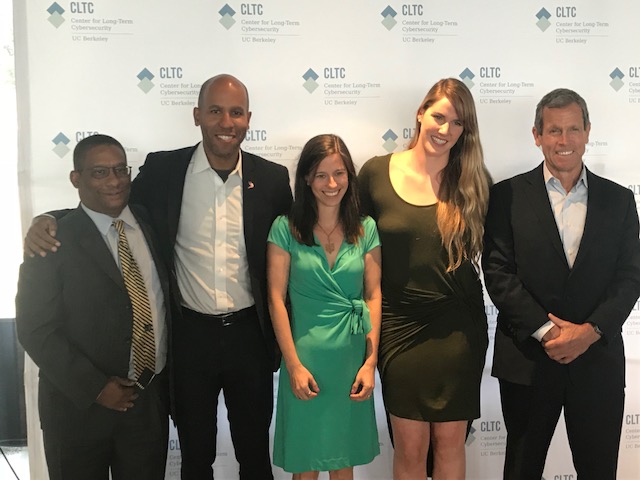
On Tuesday, October 10, CLTC hosted a panel discussion at the University Club at California Memorial Stadium focused on the new report, “The Cybersecurity of Olympic Sports: New Opportunities, New Risks.”
Authored by CLTC Executive Director Betsy Cooper, along with Katie Chen, Zoe Feist, and Chuck Kapelke, this report examines how the proliferation of digital technologies in major sporting events, while also creating great opportunities for the future of sports, is opening new potential vectors for cyberattack that could threaten public safety, diminish the fan experience, and undermine the integrity of competition.
CLTC produced the report in partnership with Cal Athletics (the University of California, Berkeley’s athletics department) as well as the Los Angeles Organizing Committee for the 2028 Olympic Games. Using the Olympic Games as a case study, the report introduces a framework for evaluating potential risks posed by digital technologies in sports, and highlights possible threats that will arise as these technologies are deployed.
The event, held in a venue overlooking the Cal football field, began with an introduction by Mike Williams, Director of Cal Athletics, who pointed out that more than 50 current, former, or future Cal athletes participated at the 2016 Rio Olympics—and that UC Berkeley researchers are working in areas relevant to Cal athletes, including sleep, leadership, head trauma, and wearable technology.
“As college athletics become more digital, we must all take precautions to protect the privacy of our students and our employees—and protect the integrity of both conditioning and competitions,” Williams said. “It is not enough to use the technology available without understanding the implications.”
Following the introduction, CLTC’s Betsy Cooper presented an overview of the report, explaining the “risk framework” used to assess potential risks based on severity, likelihood of occurrence, and detectability. She walked through some of the potential cyber incidents that could be disruptive to the Olympics and other sports, including hacks on stadiums, scoring systems, and photo and video replay systems; manipulation of digital systems used by athletes for training and self-care; hacks on transportation and entry systems; and hacks designed to induce panic or facilitate terrorism or kidnapping.
 “There’s a whole host of cybersecurity attacks that could be possible, and as we digitize major sporting events, it is more possible than it was before for these to occur,” Cooper said. “In the future, it may be possible for cybersecurity incidents to directly affect the integrity of the game and the security of our fans. By starting to think of these things now, we will have a better opportunity to prevent them from occurring.”
“There’s a whole host of cybersecurity attacks that could be possible, and as we digitize major sporting events, it is more possible than it was before for these to occur,” Cooper said. “In the future, it may be possible for cybersecurity incidents to directly affect the integrity of the game and the security of our fans. By starting to think of these things now, we will have a better opportunity to prevent them from occurring.”
Next, Cooper joined a panel discussion led by CLTC Faculty Director Steve Weber, who drew out perspectives from three Olympics insiders: Missy Franklin, five-time Olympic medalist; Brian Nelson, General Counsel for the 2028 Los Angeles Olympic Games; and Doug Arnot, Chairman of Broadstone Group, which manages security, traffic, and other logistical aspects of the Games.
“A big part of our job is risk management, and a big part of risk management is anticipation, trying to identify the areas of vulnerability on a regular basis,” Arnot said. “If I go back to the Atlanta Games, there wasn’t any mention of cybersecurity. We’ve seen how things have advanced since then, and now it’s one of our highest concerns.”

Nelson noted the importance of partnerships for the Olympic Games to run effectively—and he expressed gratitude for the collaboration with CLTC. “Having the University of California, Berkeley as a partner of ours to help us start to think about these things, that gives us as an organizing committee—and a community—a lot of confidence that we can take advantage of the opportunities that we will see going forward around technology and innovation,” he said.
Sharing the perspective of an Olympic athlete, Missy Franklin acknowledged that many facets of her life as an athlete—from her doping test results to the timing systems used in competition—could be vulnerable to digital manipulation. “We constantly get new technology thrown at us,” she said. “It’s crazy, but that’s where sports are going.”
Franklin noted she hope the report continues to “bring awareness, and make people aware of the threats that we face…. I don’t think a lot of my peers fully understand the threats of cybersecurity.”
Click here for more information about the report. You can also download the report here.

